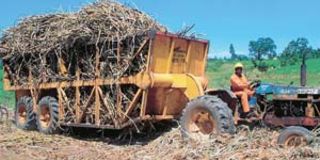Woes sour taste in sugarcane farmers’ mouths

A tractor transports sugar cane to a factory in Western Kenya. Sugarcane farming has become a raw deal for farmers after years of mismanagement of the sector. PHOTO | FILE | NATION MEDIA GROUP
What you need to know:
Last week, Muhoroni Sugar Company, now in receivership, shut down temporarily, citing low supply of raw material.
Muhoroni, essentially, pays more to farmers per ton than the nearby private miller, Kibos Sugar.
While they were fetching Sh4,050 per tonne from Muhoroni, Mr Odada claims Kibos pays Sh2,700.
Kisumu’s Nyando sugar belt has a history. And it is both good and bad. Indian coolies first arrived in the area with the Lunatic Express and settled down to cane farming.
They set up plantation cane farms that fed into Muhoroni, Chemilil and Miwani factories that all sprouted up, relying on the healthy supply of raw material, for years.
Then the bad happened. Today, sugarcane farming has gradually become a raw deal for farmers after years of mismanagement of the once lucrative sector.
Last week, Muhoroni Sugar Company, now in receivership, shut down temporarily, citing low supply of raw material. But the factory's specific problems go beyond just raw material.
NYANDO SUGAR BELT
Coming at a time cane growers are owed in excess of Sh250 million, dating back to April 2017, the news spread gloom to hundreds of farmers and other stakeholders who pegged their hopes on the last standing public miller which has been in existent since the 1960s.
“This is not sweet news for over 30,000 farmers hailing from Nyando sugar belt, coming after the closure of the neighbouring Chemelil Sugar and Miwani Sugar companies which pioneered East Africa’s sugar industry,” said Jerim Odada, a farmer in Muhoroni.
Muhoroni, essentially, pays more to farmers per ton than the nearby private miller, Kibos Sugar. Yet the latter’s machines run every day without fail. Farmers say the secret is in who pays fast, even if lower.
ESSENTIAL NEEDS
While they were fetching Sh4,050 per tonne from Muhoroni, Mr Odada claims Kibos pays Sh2,700. The Kibos factory’s management declined to confirm or deny this when asked.
“Hopelessness has become part of our lives as a majority of people cannot afford proper medication. A number of people have died from avoidable and minor ailments.,” he told the Nation.
Mr Odada recalls how people in his village used to be independent, assured of money from the factories. Now, he admits, they are paupers and routinely beg politicians for money to pay school fees, medical bills and other essential needs.
“I am personally owed Sh450,000 and this has stalled my projects,” said Mr Odada, who has begun venturing into poultry and maize farming.
Today, he is going slow on sugarcane farming and will probably stop it altogether in the near future. Of the 12 hectares once occupied by cane, he has introduced maize in four hectares, which he says is more promising compared to the cane.
POVERTY
The pointer to poverty is also reflected in the poorly maintained sugarcane plantations and feeder roads around the once vibrant Muhoroni town that has steadily become a shadow of its former self.
Since delivering his cane to Muhoroni factory in December last year, Mr Nicholas Ochieng has not bothered to take care of his one-acre farm which is now invaded by weeds and the canes having all the symptoms of nutrient deficiency.
“Lack of money has forced me to abandon the canes and cater for more pressing needs like food, shelter and medication,” said Mr Ochieng who hails from Jaber Kipturi village in Muhoroni Sub-County.
He said his delayed Sh180,000 pay by Muhoroni sugar company management has caused his family much pain and anguish.
“My 73-year old mother has been in and out of hospitals as we cannot raise enough money to get her proper medication,” he said.
We found Mama Mary Odiwuor lying helplessly in her son's living room, recuperating after being discharged from Jaber Dispensary.
Muhoroni factory was closed for six weeks on March 25 by joint receiver managers Fredrick Kebeney and Asa Okoth for lack of sugarcane to crush.





